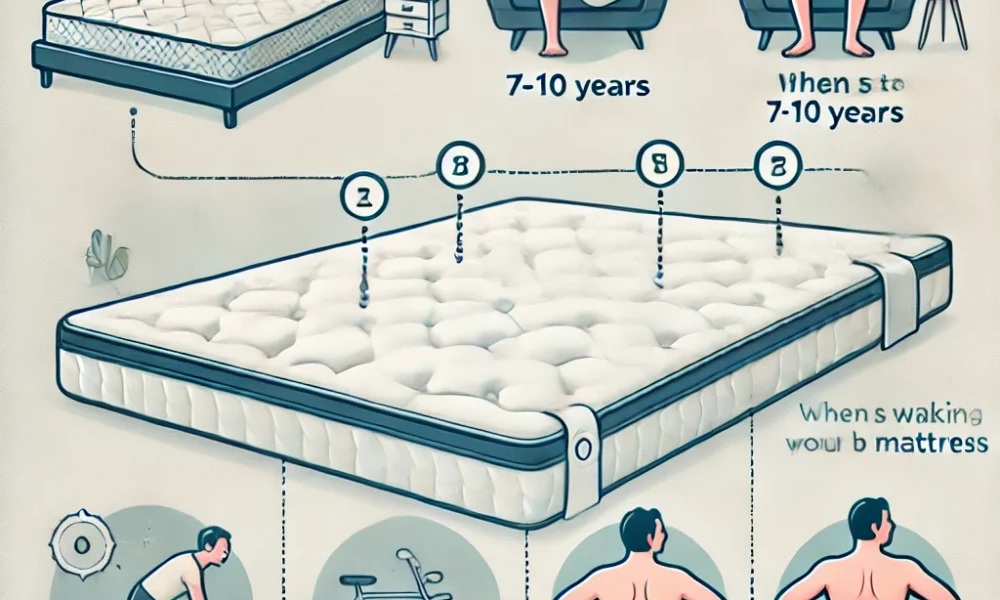When to Replace Your Mattress
When to replace your mattress is more than just a comfort issue—it’s a vital component of your sleep quality, physical health, and overall well‑being.
Key Takeaways
- Mattresses typically last 7–10 years based on type and usage.
- Pain, allergies, and poor sleep are clear signs your mattress is failing.
- Timely replacement supports posture, reduces health risks, and boosts energy.
1. Your Mattress Is Over 7–10 Years Old
The most widely accepted rule of thumb is to replace your mattress every 7–10 years. But mattress lifespan varies by type: innerspring mattresses average 6–8 years, hybrids around 6–7.5 years, latex and memory foam can last 10–15 years.
Factors affecting longevity include materials (denser foams, latex last longer), build quality, user weight, and maintenance habits A budget foam mattress could deteriorate in as little as 3 years, while a high-quality latex model can exceed 15 years

2. You Wake Up with Aches and Pains
Morning stiffness in your back, shoulders, or hips often signals inadequate support. Studies show about 7% of sleep issues stem from uncomfortable bedding and replacing an old mattress can reduce musculoskeletal pain
Sleeping on a worn mattress can strain spinal alignment, lead to pressure build-up, and worsen pain conditions like sciatica :contentReference[oaicite:5]{index=5}. When these symptoms persist for weeks, it’s a clear sign of when to replace your mattress.

3. Visible Sagging or Indentations
Sagging, lumps, or body impressions longer than 1–2 inches indicate your mattress has lost support :contentReference[oaicite:6]{index=6}. These deformities force your spine out of alignment and prompt benefit-seeking movement overnight.
Even quality mattresses with high-density foams and sturdy coils eventually break down, particularly in pressure zones. If rotating or flipping doesn’t restore shape, it’s time to address when to replace your mattress.

4. Increased Allergy Symptoms
Old mattresses become reservoirs for dust mites, bacteria, and even mold. A 7‑year‑old mattress can harbor over 16 million bacterial colony forming units per square inch
Exposure to these allergens can worsen symptoms like sneezing, itching, coughing, and asthma. Experts note that mattress-related allergens significantly impact respiratory health

5. Noticeable Noise or Squeaking
Creaking or popping noises usually mean coils or internal support have degraded. This not only disrupts sleep but also signals structural failure, requiring a more supportive replacement.
Older innerspring mattresses commonly lose coil tension and padding, generating noise and reducing comfort—so when to replace your mattress becomes urgent.
6. You’ve Experienced Major Life Changes
Life events can quickly change your sleep needs. Weight fluctuations, injury, or new sleep partners all shift pressure distribution and comfort requirements.
Medical or orthopedic advice often includes upgrading to a mattress with better ergonomic support—especially if recovering from injury or managing chronic pain. Noticing discomfort in your new circumstances signals the right time to replace.
7. You Sleep Better Elsewhere
If hotel or guest bed sleep consistently outshines your own, your mattress isn’t doing its job. A bed that supports you well in other settings reveals shortcomings in your current mattress.
This natural comparison helps you determine when to replace your mattress—your sleep self already knows.
The Impact of Ignoring When to Replace Your Mattress
Delaying replacement adds up: chronic pain, disrupted REM sleep, allergy buildup, lowered immunity, and mental fog become regular issues
Poor sleep environment impacts memory, mood, cardiovascular risk, and weight. Investing in a timely mattress replacement is one of the most direct ways to improve overall health.
Sleep Quality: A Key Factor in Deciding When to Replace Your Mattress
Quality sleep is essential for daily function. A degraded mattress interrupts REM cycles and restorative sleep, triggering fatigue, stress, and cognitive decline
Refreshing sleep begins with proper support—knowing when to replace your mattress helps restore energy, stability, and productivity.
Want to learn about the latest sleep technology advancements? Read our article on innovative sleep technology.
When to Replace Your Mattress for Better Posture and Support
Proper posture during sleep supports spinal health. A failing mattress disrupts contour and alignment, leading to compensatory body positions that cause pain
If you’re tossing and turning, constantly adjusting, or waking stiff, it’s a strong indication—when to replace your mattress has arrived to preserve your spinal health.
How to Extend the Life of Your Current Mattress
- Rotate every 3–6 months; flip double-sided mattresses regularly :contentReference[oaicite:12]{index=12}.
- Use a waterproof, breathable protector to guard against spills, allergens, and sweat.
- Vacuum and air out to prevent moisture and dust mite accumulation.
- Add a supportive topper to temporarily boost comfort—but only as a stopgap.
- Use a solid foundation or slatted base to prevent premature sagging :contentReference[oaicite:13]{index=13}.
These practices may extend your mattress lifespan—but don’t ignore clear signs. Eventually, replacement is necessary for optimal sleep health.
Recognizing when to replace your mattress is one of the simplest yet most powerful improvements you can make for your sleep and health. Don’t delay—your body’s nightly rest depends on it.
FAQ
How often should I replace my mattress?
Experts generally recommend replacing your mattress every 7–10 years, though innerspring models may need replacement every 6–8 years and high-quality memory foam or latex may last up to 15 years :contentReference[oaicite:14]{index=14}.
Can a bad mattress affect my health?
Absolutely. Old mattresses can worsen allergy and asthma symptoms, contribute to back and joint pain, impair sleep quality, weaken immunity, and even affect mood and cognition :contentReference[oaicite:15]{index=15}.
What type of mattress lasts the longest?
Latex and high-density memory foam mattresses typically have the longest lifespan, often lasting 10–15 years or more, while innerspring and hybrid models tend to degrade sooner :contentReference[oaicite:16]{index=16}.
Learn more in our eco-friendly mattress guide, how to choose a mattress for back pain, and our complete mattress cleaning guide.
For trusted insights, visit Sleep Foundation on mattress lifespan and WebMD on mattress health hazards.























